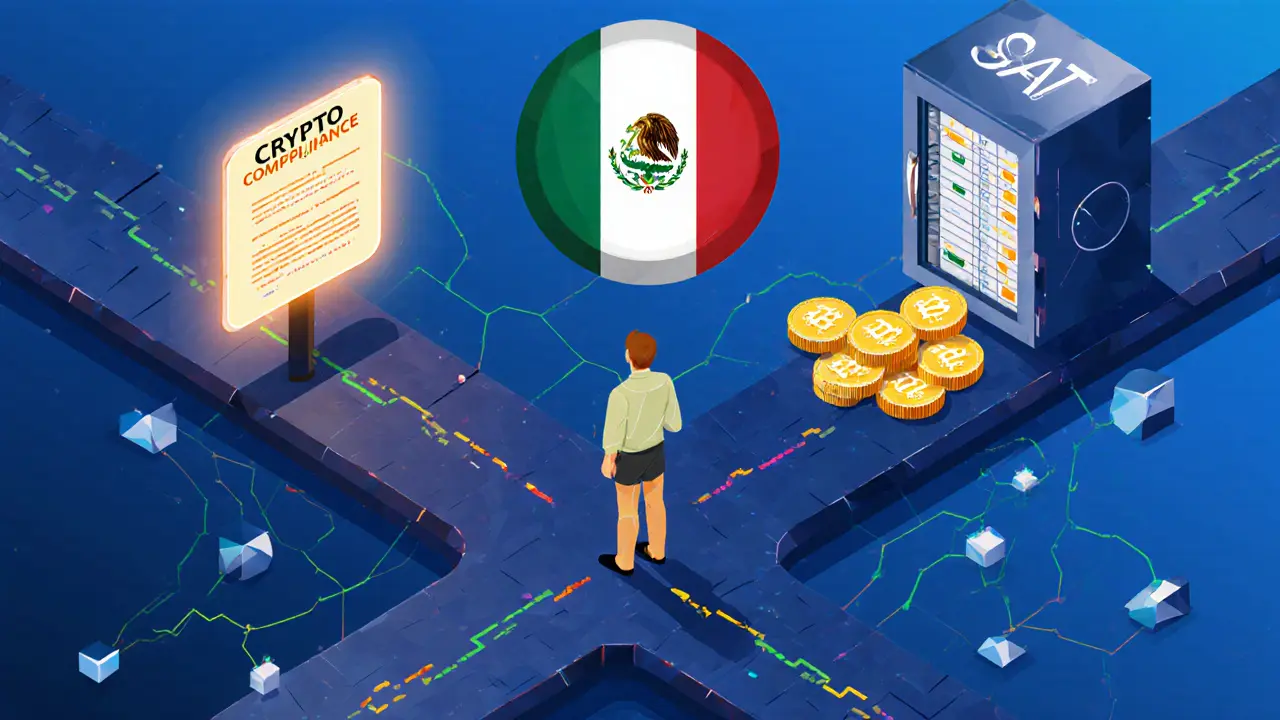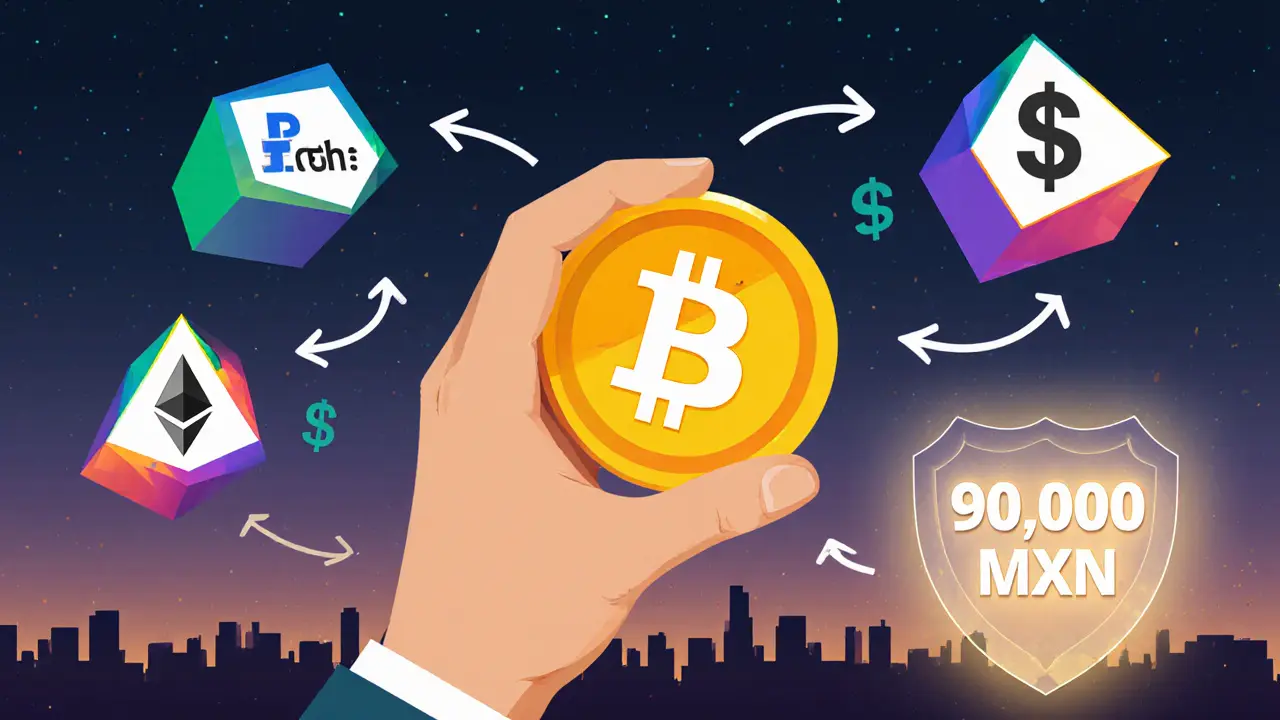Mexico Crypto Tax Calculator
Tax Calculator
When you buy, sell, or use Bitcoin or Ethereum in Mexico, you might not think about taxes - but the government does. Unlike countries with clear crypto tax laws, Mexico doesn’t have a special rulebook for cryptocurrency. Instead, your crypto transactions are treated like any other property sale under existing tax laws. That means every trade, swap, or purchase with crypto could trigger a tax bill - even if you never cash out to pesos.
What Counts as a Taxable Event?
In Mexico, you don’t owe taxes just because your Bitcoin went up in value. Taxes kick in only when you realize a gain - meaning you actually do something with the crypto. That includes:
- Selling crypto for Mexican pesos or any foreign currency
- Exchanging one cryptocurrency for another (like BTC for ETH)
- Using crypto to buy goods or services - even a coffee
- Gifting or transferring crypto to someone else (in some cases)
Here’s the catch: if you hold your crypto and it rises from $10,000 to $15,000, you pay nothing until you sell or spend it. But the moment you trade that Bitcoin for Ethereum, the IRS-style rule applies - you’re treated as if you sold the Bitcoin at its market value and bought Ethereum with the proceeds. That’s a taxable event, even if you still hold crypto.
How Much Tax Do You Pay?
Tax rates depend on whether you’re an individual or a business.
For individuals: Mexico uses a progressive income tax system that ranges from 1.92% to 35%. Crypto gains are added to your total annual income and taxed at your highest marginal rate. There’s no separate capital gains rate. But here’s the relief: Mexican residents get a yearly exemption of up to 90,000 Mexican pesos (about $4,000 USD) on gains from movable property - including crypto. If your total crypto profits for the year are below that amount, you owe nothing.
For companies: All businesses, whether they’re startups or corporations, pay a flat 30% on crypto profits. No matter if you held Bitcoin for one day or one year - the rate stays the same. There’s no discount for long-term holdings.
For example: If you’re an individual who made $6,000 in crypto gains this year, you’d pay tax on $2,000 (the amount over the $4,000 exemption). If your total income puts you in the 30% bracket, you’d owe $600 in taxes on that gain.
What About Mining, Staking, and Airdrops?
There’s no official guidance from Mexico’s tax authority (SAT) on these activities, but experts agree on how they’re likely treated based on existing rules.
Mining: When you mine Bitcoin or any crypto, the coins you receive are treated as income. The value is calculated at the market price in pesos on the day you receive them. That amount is added to your income and taxed at your personal rate. Later, if you sell those mined coins, any increase in value is treated as a capital gain - subject to the same rules.
Staking and DeFi rewards: If you earn interest or rewards from staking Ethereum or lending crypto on a DeFi platform, those rewards are considered income. You pay tax on the peso value at the time you receive them. No exemption applies here - even if you don’t sell.
Airdrops and hard forks: If you get free tokens from a hard fork or airdrop, they’re treated as income when you gain control of them. You pay tax on their value in pesos at that moment. Later sales are subject to capital gains.

Record Keeping Is Non-Negotiable
Mexico doesn’t give you a checklist for crypto records - but you still need them. The tax authority expects you to prove your cost basis and transaction history if you’re ever audited. Without records, they can estimate your income - and they’ll likely overestimate it.
You must track:
- Date and time of every acquisition (buy, mine, receive reward)
- Amount of crypto received
- Cost in pesos at the time of acquisition (including fees)
- Date and time of every disposal (sell, trade, spend)
- Amount received in pesos or equivalent value of new crypto
- Wallet addresses and exchange names involved
There’s no official rule on cost basis calculation, but the standard practice is First-In-First-Out (FIFO). That means the first crypto you bought is considered the first you sold. If you bought 1 BTC at $30,000 and later bought another at $45,000, and then sold 1 BTC at $50,000, FIFO says you sold the first one - so your gain is $20,000.
What About Crypto Payments and Exchanges?
Using crypto to pay for something isn’t just a transaction - it’s a sale. If you buy a laptop with 0.5 BTC worth $25,000, and you originally bought that BTC for $15,000, you’ve triggered a $10,000 capital gain. That’s taxable income.
Same goes for crypto-to-crypto trades. Swapping Solana for Cardano? That’s two events: you sold Solana and bought Cardano. You owe tax on the gain from Solana, even if you never touched pesos.
This is why frequent traders in Mexico face a heavy compliance burden. Every swap, every purchase - it all adds up. One person doing 50 trades a year could have 50 taxable events.
Reporting Requirements and AML Rules
It’s not just taxes. Mexico’s anti-money laundering laws force you to report crypto activity above a certain threshold.
If you’re a non-financial entity - meaning you’re not a bank or licensed exchange - and you conduct a crypto transaction worth $3,500 USD or more, you must report it to the Ministry of Finance. This applies to individuals too. That means even if you’re just an investor sending $4,000 worth of ETH to a friend, that transaction is flagged.
Financial institutions like fintech companies must get approval from Banco de México to operate, and even then, they can’t offer crypto services to the public. The system is designed to limit exposure, not encourage adoption.

How Mexico Compares to Other Latin American Countries
Mexico’s approach is middle-of-the-road in Latin America.
El Salvador once made Bitcoin legal tender - and tax-free. But as of January 2025, that changed. Now, Bitcoin gains are taxed like any other asset. Argentina offered a crypto tax amnesty until March 31, 2025, letting people declare hidden holdings without penalty. Brazil taxes crypto like stocks - with a 15% capital gains rate on sales over 35,000 BRL.
Mexico doesn’t have a preferential rate. The 35% top rate for individuals is among the highest in the region. The $4,000 exemption helps small investors, but it’s low compared to Brazil’s 35,000 BRL (~$7,000 USD) threshold or Colombia’s exemption for gains under 1,000 UVT (~$11,000 USD).
What’s Next for Crypto Tax in Mexico?
Don’t expect big changes soon. President Claudia Sheinbaum’s administration hasn’t signaled any major crypto reforms. The ruling Morena Party has made small amendments - like adding a 20% tax on gains - but no comprehensive law has passed. The current system is built on old rules stretched to fit new tech.
That creates uncertainty. What happens if you receive a token from a DAO? Is a DeFi loan a taxable event? No one knows for sure. Tax professionals in Mexico advise clients to assume the worst-case interpretation: every movement is taxable unless proven otherwise.
The government’s focus remains on AML and preventing illicit use, not supporting innovation. That means compliance costs are high, and the rules are unclear. Many crypto users stay under the radar - but that’s risky. The tax authority has tools to track transactions through exchanges and wallet analytics.
What Should You Do?
If you’re an individual in Mexico with crypto:
- Track every transaction - use a crypto tax tool that supports Mexican peso conversions
- Know your $90,000 peso exemption limit
- Don’t assume small trades are invisible - they’re still taxable
- Keep records for at least five years
- Consult a Mexican tax advisor who understands crypto
If you’re a business:
- Pay 30% on all crypto profits
- Include crypto income in your annual tax return
- Report any transactions over $3,500 USD to the Ministry of Finance
- Don’t use crypto to avoid payroll or VAT obligations - that’s a red flag
The bottom line: Crypto isn’t tax-free in Mexico. It’s not banned. It’s not encouraged. It’s just treated like any other asset - and the rules are applied strictly. If you’re active in crypto, you’re already in the system. The question isn’t whether you’ll be taxed - it’s whether you’ll be ready when you are.
Are crypto-to-crypto trades taxable in Mexico?
Yes. Exchanging one cryptocurrency for another - like Bitcoin for Ethereum - is treated as a sale of the first asset and a purchase of the second. You must calculate the fair market value in pesos at the time of the trade. Any gain over your original cost basis is taxable as capital income.
Do I pay tax if I just hold crypto and it increases in value?
No. Holding crypto without selling, trading, or spending it does not create a taxable event in Mexico. Taxes only apply when you realize a gain - meaning you dispose of the asset in some way. Appreciation alone is not taxed.
Is there a tax exemption for small crypto gains?
Yes. Mexican individuals are exempt from paying income tax on capital gains from movable property (including crypto) up to 90,000 Mexican pesos per year (roughly $4,000 USD). If your total crypto profits for the year are below this amount, you owe no tax. Gains above this threshold are added to your income and taxed at your marginal rate.
Do I need to report crypto transactions to the government?
Yes - but not for tax purposes directly. Under anti-money laundering rules, any crypto transaction valued at $3,500 USD or more must be reported to the Ministry of Finance and Public Credit, regardless of whether you’re an individual or business. This is separate from your annual tax return and applies even if you don’t owe tax.
How are staking rewards taxed in Mexico?
Staking rewards are treated as income when you receive them. You must calculate their value in Mexican pesos at the time of receipt and include that amount in your annual income. The tax rate depends on your total income level, up to 35%. Later, if you sell those rewards, any additional gain is subject to capital gains tax.
Can I use FIFO to calculate my crypto cost basis in Mexico?
While there’s no official rule, the Mexican tax authority accepts First-In-First-Out (FIFO) as the standard method for calculating cost basis for movable property like crypto. This means the first coins you bought are considered the first ones sold. Most tax professionals and software tools use FIFO to comply with local practice.
Do I pay VAT on crypto purchases in Mexico?
Yes. Cryptoassets are classified as intangible movable property. When you buy or sell crypto, the transaction may be subject to the standard VAT rate (16% in most areas). However, VAT treatment depends on the nature of the transaction and whether the seller is a registered business. Many small transactions are exempt in practice, but the legal framework allows VAT to apply.
What happens if I don’t report my crypto gains?
You risk penalties, interest charges, and potential audits. Mexico’s tax authority can access transaction data from exchanges and financial institutions. If you’re caught underreporting, you could face fines of up to 75% of the unpaid tax, plus interest. In extreme cases, repeated non-compliance may lead to legal action.

anthony silva
November 15, 2025 AT 01:18Also who the hell tracks every single swap? I'm not a spreadsheet wizard I'm a guy who likes memes.
David Cameron
November 16, 2025 AT 08:49It's whether the state has the right to tax a transaction that never touched fiat
Money is a social contract
But when the contract gets rewritten by bureaucrats who don't understand the tech
Who are we really serving?
Sara Lindsey
November 17, 2025 AT 05:37You're not losing money you're just paying tax on gains you didn't even cash out
That's the magic of crypto
It forces you to think like an investor not a gambler
And yeah tracking is annoying but you're building something real
Just use a tool
Stop complaining
You got this
alex piner
November 17, 2025 AT 07:27im just used to the us where you dont pay till you cash out
but swapping btc for eth? thats wild
but also kinda makes sense
im gonna start using a tracker now lol
Gavin Jones
November 19, 2025 AT 02:48Mauricio Picirillo
November 20, 2025 AT 10:46but now I see even regular folks in Mexico are getting tangled up in this
just keep your receipts
and if you're not sure ask someone who knows
you dont gotta be a genius
just be organized
Liz Watson
November 21, 2025 AT 12:06Let me get this straight - you can't even buy a burrito with Bitcoin without the state demanding a cut?
And you call this innovation?
It's just feudalism with a blockchain UI.
Rachel Anderson
November 21, 2025 AT 19:11It's like the government is watching every single wallet address
Every swap
Every coffee
Every heartbeat of my crypto life
And they're not even trying to understand
They just want to tax it
Why? Why do they hate freedom so much?
Hamish Britton
November 21, 2025 AT 23:42And yes, FIFO is fine. No need to overcomplicate it.
Robert Astel
November 23, 2025 AT 01:14It's about the philosophy of ownership
When you hold crypto you're holding a piece of the future
But when the state says every time you move it you owe them a cut
You're not just paying tax
You're paying for the privilege of existing in a digital economy that doesn't yet have its own rules
And that's why we need a new kind of governance
Not just better tax forms
But a new social contract
One where the code is the law
Not some bureaucrat in Mexico City with a calculator
And don't even get me started on how they treat airdrops like income
That's like taxing you for receiving a birthday gift
It's just wrong
And the fact that no one's challenging this
Is the real tragedy